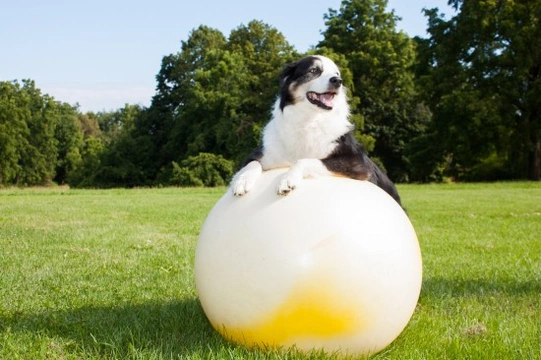
Try treibball with your dog - The newest canine sport!
If you have never heard of treibball, you are probably not alone! Treibball is the newest canine sport to enter sanctioned competition, and while it is best known in Germany, where it originated, it is fast catching on across the rest of the world too.
Treibball is a great way to exercise your dog and really get them working with both their body and their mind, and it was first thought up with herding dog breeds in mind, to allow them an outlet for their energy levels and mental talents! However, any breed or type of dog can try their paw at treibball, and it is an excellent way to forge a stronger bond with your dog and really get them working and communicating with you.
Treibball is, as mentioned, an organised competitive sport, and there are various clubs, groups and events organised throughout the year to allow dog owners to have a go at it. However it is entirely possible to set yourself up to play treibball at home with your own dog, with only a little financial outlay and space required to get yourself going!
So, do you want to find out more? Read on to learn all about treibball, and how to get started!
What equipment do you need to get started?
It is really easy to get yourself started off at treibball, as all the game requires is a goal net such as you would use for football, and a range of large inflatable exercise balls of the type you can find in most sports shops.
The competitive sport of treibball involves eight exercise balls of a uniform size, but you don’t need that many to start off with, and can pick and choose different sizes to suit your own dog.
What happens in treibball?
The game of treibball involves using remote commands with your dog to assist them to “herd” the exercise balls into the finish net, something that can be very entertaining to watch and really get your dog engaged in the game! This can prove more complicated than it first seems, as the exercise balls appear to have a mind of their own and really stretch your dog’s abilities to herd and problem-solve on the go.
What type of dogs might enjoy treibball?
Dogs of any age, breed and type can have a go at treibball, and every canine from toy dog size to heavier breeds to working dogs might potentially enjoy it.
The sport was originally designed to appeal to working herding dog breeds, such as the Border Collie, Lancashire Heeler, various shepherd dog breeds, Welsh Corgis, and many others!
Many dogs that have strong hunting instincts, such as terriers, will also take to the game with ease. Regardless of the breed or type of your dog, if they have bundles of energy, are reasonably intelligent and love to play games such as chasing and catching a ball, they are likely to enjoy treibball too.
How the game works competitively
In organised competition, treibball is a structured and timed event with guidelines and rules that must be followed. Competition uses eight balls of 45-75cm diameter, set up in a triangular formation, which the dog must herd into the goals within a set period of time, usually about 15 minutes.
The dog handler remains relatively static throughout the game, and is not allowed to move outside of their set area nor touch their dog during the game. The handler may use whistles, verbal commands or hand signals to guide and direct the dog, directing them to put one ball at a time into the goals. Scoring is based on the communication, skill and cooperation between the dog and the handler, and points and deductions can be made to the score over the course of the timed round.
Treibball groups and clubs
While treibball has yet to catch on in a big way within the UK, it is fast proving to be a firm favourite among herding dog breed clubs, agility groups and dog trainers. There are a range of treibball groups and websites dedicated to the sport within the UK, including a British Treibball Club Facebook group and many small, local organisations.
Your dog will need to be responsive and have a good basic level of recall and obedience training to have a go at the sport within a group, and treibball can actually help you to work on your dog’s skills and responses, providing both entertainment and numerous benefits for both of you too!
If you’re not sure where to find a treibball club in your local area, talk to dog trainers, agility clubs and others involved in canine sport to find out their recommendations for where to try it out. As the sport is currently unregulated and not played competitively in affiliated competitions within the UK, you could even consider setting up a group or club of your own once you have mastered the basic skills with your dog!



